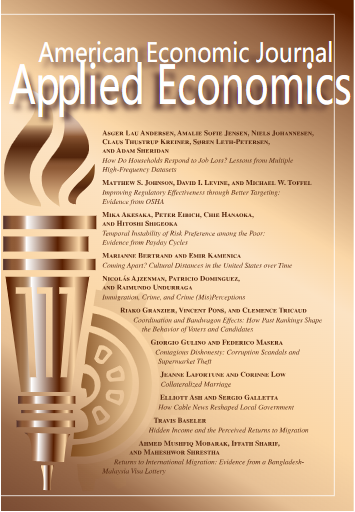劳动力供给与指导性技术变革:来自1964年布拉塞罗计划终止的证据
IF 6.2
1区 经济学
Q1 ECONOMICS
引用次数: 1
摘要
本文研究劳动力供给对新技术创造的影响,利用1964年底美墨布雷塞罗协定的终止对美国农业劳动力供给造成的巨大外生冲击。通过使用文本搜索算法为作物分配专利,我展示了负劳动力供给冲击导致与受影响更大的作物相关的技术创新急剧增加。对于与劳动密集型生产任务相关的技术,这种影响更强。农场价值动态表明,尽管有积极的技术反应,但政策变化对农场主来说是不可取的。(j22, j43, n32, o33, o34, q12, q16)本文章由计算机程序翻译,如有差异,请以英文原文为准。
Labor Supply and Directed Technical Change: Evidence from the Termination of the Bracero Program in 1964
This paper studies the impact of labor supply on the creation of new technology, exploiting a large exogenous shock to the US agricultural labor supply caused by the termination of the Bracero agreements between the US and Mexico at the end of 1964. Using a text-search algorithm allocating patents to crops, I show a negative labor-supply shock induced a sharp increase in innovation in technologies related to more affected crops. The effect is stronger for technology related to labor-intensive production tasks. Farm-value dynamics indicate that, despite the positive technology reaction, the policy change was undesirable for farm owners. (JEL J22, J43, N32, O33, O34, Q12, Q16)
求助全文
通过发布文献求助,成功后即可免费获取论文全文。
去求助
来源期刊

American Economic Journal-Applied Economics
ECONOMICS-
CiteScore
9.10
自引率
1.60%
发文量
63
期刊介绍:
American Economic Journal: Applied Economics publishes papers covering a range of topics in applied economics, with a focus on empirical microeconomic issues. In particular, we welcome papers on labor economics, development microeconomics, health, education, demography, empirical corporate finance, empirical studies of trade, and empirical behavioral economics.
 求助内容:
求助内容: 应助结果提醒方式:
应助结果提醒方式:


